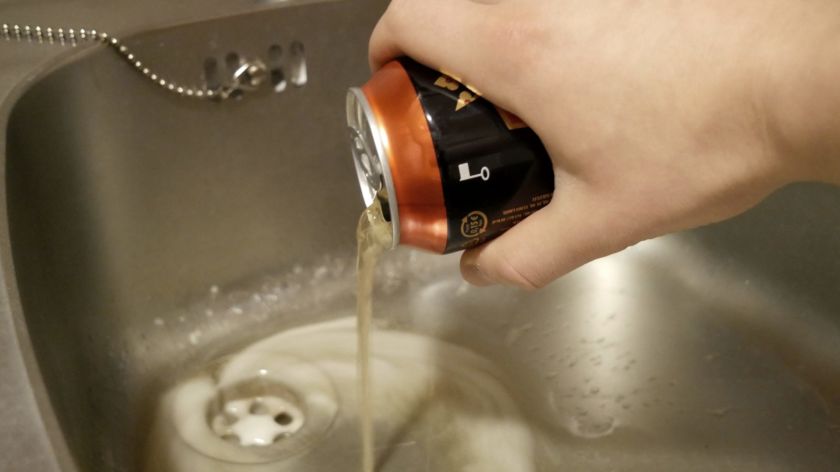The sense and nonsense of Dry January
-
 Photo: Santeri Viinamäki, Wikimedia Commons
Photo: Santeri Viinamäki, Wikimedia Commons
The end of Dry January is in sight. Does voluntarily giving up alcohol for a month actually have any noticeable effects on your health and is it a good way to change your behaviour? Thankfully, the answer to both is 'Yes'.
There’s no getting away from it, even if you’re not taking part: Dry January. Television broadcaster BNNVARA even dedicated a whole month to the subject. Now that the end of the voluntary abstention is in sight this week, the question arises to what extent it makes sense to refrain from drinking alcohol for a month. And how do you stick to such a lifestyle change if you want to keep it up in February?
It’s an indisputable fact that alcohol is bad for you, says Isabelle Munsterman, trainee gastroenterologist at Rijnstate Hospital in Arnhem. Not drinking alcohol is always healthier. Health organisations also recommend keeping alcohol to a minimum. The Dutch Health Council recommends drinking no alcohol at all, or at most one glass a day.
Liver transplant
Munsterman lists the physical consequences: ‘Drinking alcohol increases the risks of developing cancer, diabetes and Alzheimer’s disease.’ The liver in particular suffers greatly. ‘Long-term excessive consumption of alcohol leads to a fatty liver and in extreme cases can cause scarring of the liver, known as cirrhosis. Your liver can no longer function properly.’ Sometimes a liver transplant is necessary.

Even only refraining from drinking in Dry January has a demonstrable effect on your body, as Munsterman discovered two years ago, during her doctoral research at Radboudumc. She joined science programme ‘De Kennis van Nu’, broadcast by NTR, to analyse the blood of thirty residents of Nijmegen of whom half had refrained from drinking alcohol for one month and the other half never drank alcohol.
What was the finding? People who stopped drinking alcohol for a month showed significantly less Gamma GT in their blood than previously when they drank on average ten glasses a week. ‘Gamma GT is a substance which indicates the amount of stress the liver has,’ explains Munsterman. ‘It´s a first sign of damage.’ When the test subjects went back to drinking, the levels in their blood went back to what they had been before.
A soft drink is okay
The effects measured – which have now been published in professional journal Alcohol & Alcoholism – were admittedly slight, but Munsterman still believes it’s worth not drinking for a month. ‘If you do that every year, it adds up in the end to years without alcohol.’
And lastly, she emphasises we shouldn’t forget the effect of Dry January on our behaviour. ‘Socially, alcohol is so self-evident that sometimes it takes a month of not drinking to realise that a soft drink is also okay.’
Risk situations
Joining in with media-friendly Dry January is one thing but continuing to refrain from drinking alcohol after 1 February is another. How do you keep it up? Harm Veling, who is researching good resolutions, in particular in the area of eating behaviour, says that three things are important. Firstly, motivation. ‘It often starts with a resolution, for example wanting to live more healthily.’ He explains that motivation alone is not enough, as can be seen from the fact that almost half of the world’s population wants to lose weight but in spite of that, we grow heavier on average, every year.
‘Motivation alone is not enough’
That’s because ‘competence’ is an important defining factor, the Associate Professor of Social and Cultural Psychology goes on to say, or in other words, knowing what you have to do to achieve your goal. For example, as mentioned earlier, being aware of what alcohol does to you and also which situations are risky. ‘Ideally, you need to avoid places where the temptation is strong, such as a bar for example. The problem is that avoiding that situation can also conflict with other personal goals, such as relaxing and maintaining friendships.’

Not too strict
For that reason, sticking to a resolution is dependent to an important extent on those around you – the final factor for success. You have to involve other people in your resolution, says behavioural scientist Veling. ‘Broadcast the fact that you want to drink less or lose weight. The more those around you support and encourage you, the easier it will be to sustain your new lifestyle.’
And if you do fall back into your old ways, don’t be too hard on yourself, he adds. ‘In the end, motivation will not be enough to get you through difficult situations filled with temptation. Lifestyle changes are hard.’ And anyway, there’ll be another Dry January next year.
Low-alcohol beer-of-the-week in the CultuurCafé
The CultuurCafé is taking part in Dry January in its own way, manager Vincent Barendregt tells us. The bar is offering alcohol-free and low-alcohol beer at reduced prices all month, as its beer-of-the-week. People could vote through Instagram for the beer that would be on special offer the following week. This final week, that’s Erdinger Alkolfrei.
Barendregt too has noticed that beer with less alcohol is becoming more popular, in particular the special beers. ‘People want to drink a delicious special beer, but don’t fancy getting drunk after two beers. So now they choose a Session IPA – reduced-alcohol IPAs – instead of the 8.5% Triple they used to drink.’ The CultuurCafé has seven alcohol-free beers, ranging from Grolsch 0.0 to Palm 0.0.



